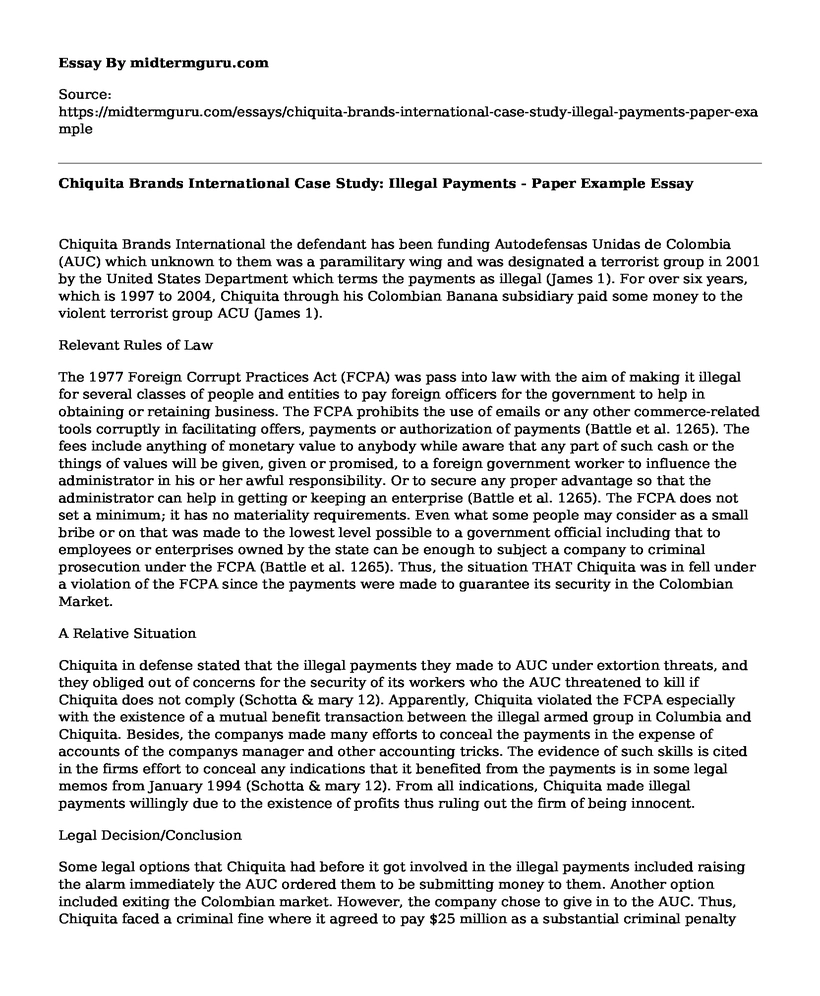Chiquita Brands International the defendant has been funding Autodefensas Unidas de Colombia (AUC) which unknown to them was a paramilitary wing and was designated a terrorist group in 2001 by the United States Department which terms the payments as illegal (James 1). For over six years, which is 1997 to 2004, Chiquita through his Colombian Banana subsidiary paid some money to the violent terrorist group ACU (James 1).
Relevant Rules of Law
The 1977 Foreign Corrupt Practices Act (FCPA) was pass into law with the aim of making it illegal for several classes of people and entities to pay foreign officers for the government to help in obtaining or retaining business. The FCPA prohibits the use of emails or any other commerce-related tools corruptly in facilitating offers, payments or authorization of payments (Battle et al. 1265). The fees include anything of monetary value to anybody while aware that any part of such cash or the things of values will be given, given or promised, to a foreign government worker to influence the administrator in his or her awful responsibility. Or to secure any proper advantage so that the administrator can help in getting or keeping an enterprise (Battle et al. 1265). The FCPA does not set a minimum; it has no materiality requirements. Even what some people may consider as a small bribe or on that was made to the lowest level possible to a government official including that to employees or enterprises owned by the state can be enough to subject a company to criminal prosecution under the FCPA (Battle et al. 1265). Thus, the situation THAT Chiquita was in fell under a violation of the FCPA since the payments were made to guarantee its security in the Colombian Market.
A Relative Situation
Chiquita in defense stated that the illegal payments they made to AUC under extortion threats, and they obliged out of concerns for the security of its workers who the AUC threatened to kill if Chiquita does not comply (Schotta & mary 12). Apparently, Chiquita violated the FCPA especially with the existence of a mutual benefit transaction between the illegal armed group in Columbia and Chiquita. Besides, the companys made many efforts to conceal the payments in the expense of accounts of the companys manager and other accounting tricks. The evidence of such skills is cited in the firms effort to conceal any indications that it benefited from the payments is in some legal memos from January 1994 (Schotta & mary 12). From all indications, Chiquita made illegal payments willingly due to the existence of profits thus ruling out the firm of being innocent.
Legal Decision/Conclusion
Some legal options that Chiquita had before it got involved in the illegal payments included raising the alarm immediately the AUC ordered them to be submitting money to them. Another option included exiting the Colombian market. However, the company chose to give in to the AUC. Thus, Chiquita faced a criminal fine where it agreed to pay $25 million as a substantial criminal penalty (Carasik 2). Under the plea agreement, the defendant consented to maintain an effective compliance and ethics program that enacting corporate governance and compliance by having a counsel presents Chiquitas Board of Directors with management compliance changes which include separating the Chief Executive Chairman and Officer Duties and adopting a majority voting for director elections (Karasik 3). The company was also put on probation for five years.
Works Cited
Bartle, Sarah, Chris Chamberlain, and Brian Wholberg. "Foreign Corrupt Practices Act." Am. Crim. L. Rev. 51 (2014): 1265.
Carasik, Lauren. "The Uphill Battle to Hold US Corporations Accountable for Abuses Abroad." (2014).
James, Cox. Chiquita and The U.S. Deprtment of Justice. (2012).
Schotter, Andreas, and Mary Teagarden. Blood Bananas: Chiquita in Colombia. Arizona: Thunderbird School of Global Management, 2010.
Cite this page
Chiquita Brands International Case Study: Illegal Payments - Paper Example. (2021, Jun 18). Retrieved from https://midtermguru.com/essays/chiquita-brands-international-case-study-illegal-payments-paper-example
If you are the original author of this essay and no longer wish to have it published on the midtermguru.com website, please click below to request its removal:
- Essay on Introduction of Federal Court System
- A Letter of Inquiry to the Ex-Husband With a Request to See the Children
- Paper Example on Criminal Justice System
- What Causes Structural Racism in the Justice System? - Paper Example
- Essay Sample on Release Mechanisms
- The American Nazi Party: A History of Extremism - Essay Sample
- Juvenile Delinquency & Adult Crime: Exploring the Link - Essay Sample







